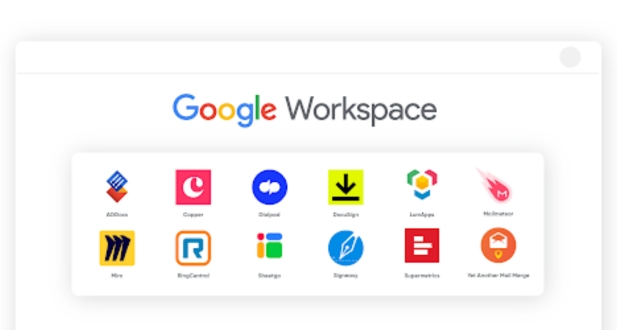Introduction
In the dynamic and competitive world of real estate, efficient collaboration and streamlined workflows are paramount for success. Google Workspace for Real Estate emerges as a tailored solution designed to meet the unique needs of professionals in the real estate industry.
Definition of Google Workspace for Real Estate:
Google Workspace for Real Estate is a comprehensive suite of cloud-based tools and applications designed to enhance collaboration, communication, and productivity within the real estate sector. It provides a centralized platform where real estate professionals can seamlessly manage their operations, from property listings and client interactions to document creation and secure data storage.
Importance of Tailored Solutions for Real Estate Professionals:
Real estate transactions involve multifaceted processes, including property management, client interactions, and documentation. Tailored solutions, like Google Workspace for Real Estate, recognize and address the specific challenges faced by real estate professionals. This industry-specific approach ensures that tools are not only user-friendly but also cater to the intricacies of property transactions, fostering efficiency and effectiveness.
Overview of Google Workspace’s Role in Real Estate Productivity:
Google Workspace serves as a pivotal catalyst in elevating productivity within the real estate landscape. Its integrated set of tools fosters seamless collaboration among team members, facilitates efficient communication with clients, and provides a secure environment for handling sensitive property and client data. From drafting compelling listing presentations to coordinating property viewings, Google Workspace is designed to be the go-to solution for real estate professionals seeking a competitive edge.
As we delve into the intricacies of Google Workspace for Real Estate, we will explore its features, benefits, customization options, and future trends, offering a comprehensive guide for real estate professionals looking to optimize their workflows and thrive in the digital era.
Understanding Workspace Plans for Real Estate
Google Workspace offers a range of plans specifically tailored for real estate professionals, providing tools that enhance collaboration, streamline communication, and improve overall productivity.
Overview of Google Workspace Real Estate Plans:
Google Workspace for Real Estate introduces plans designed to cater to the unique needs of professionals in the industry. These plans go beyond standard business offerings, providing features and applications that are directly relevant to real estate operations. From managing property listings to ensuring secure communication with clients, each plan is crafted to facilitate seamless workflows within the real estate sector.
Comparison of Basic, Business, and Industry-Specific Packages:
- Basic Plan: Ideal for smaller real estate agencies or individual professionals, the Basic Plan offers essential collaboration tools, including Gmail, Google Calendar, and Google Drive. It provides a foundation for digital communication and document management.
- Business Plan: Suited for growing real estate agencies, the Business Plan builds upon the Basic Plan by introducing advanced features. This includes expanded storage, enhanced security measures, and the integration of additional applications like Google Meet for virtual property viewings and team meetings.
- Industry-Specific Packages: Google Workspace for Real Estate takes customization a step further with industry-specific packages. These packages are curated to address the unique requirements of real estate professionals, incorporating features such as property management tools, client communication enhancements, and secure document sharing for transactions.
Scalability and Flexibility for Real Estate Agencies: Real estate agencies vary in size and operational needs. Google Workspace’s scalability ensures that whether you’re a small boutique agency or a large enterprise, there’s a plan that can be tailored to your specific requirements. As your agency grows, you can seamlessly transition to more advanced plans, ensuring that your digital infrastructure evolves with your business.
In the next sections, we will delve deeper into the features and benefits offered by Google Workspace for Real Estate, exploring how each plan aligns with the diverse needs of real estate professionals and agencies.
Features and Benefits for Real Estate Professionals
Collaboration Tools Tailored for Real Estate:
- Gmail for Professional Communication: Google Workspace’s Gmail ensures that real estate professionals have a secure and professional email communication platform. It supports efficient communication with clients, colleagues, and partners.
- Google Meet for Virtual Property Tours and Client Meetings: In the real estate industry, virtual property tours and client meetings are becoming increasingly common. Google Meet facilitates high-quality video conferencing, allowing real estate professionals to conduct virtual property tours and consultations with clients, regardless of geographical locations.
- Google Drive for Secure Document Storage and Sharing: Real estate transactions involve a significant amount of documentation. Google Drive provides a secure and organized platform for storing and sharing documents related to property listings, contracts, and other essential paperwork. It ensures that all stakeholders have access to the latest and relevant information.
Productivity Applications Aligned with Real Estate Workflows:
- Google Docs, Sheets, and Slides for Collaborative Listing Presentations: Creating collaborative listing presentations becomes seamless with Google Docs, Sheets, and Slides. Real estate professionals can work together on compelling presentations, incorporating property details, market analyses, and visuals to impress clients.
- Google Calendar for Scheduling Property Viewings: Efficient scheduling is crucial in real estate. Google Calendar allows professionals to schedule property viewings, client meetings, and other appointments. Integration with Gmail ensures that appointments are automatically added, reducing the risk of scheduling conflicts.
- Google Forms for Streamlining Client Information Collection: When gathering information from clients, Google Forms simplifies the process. Real estate professionals can create customized forms to collect client preferences, property requirements, and feedback, streamlining communication and enhancing client satisfaction.
Administrative Controls and Security Features:
- Admin Console for Centralized Management: The Admin Console provides centralized control over Google Workspace settings, allowing administrators in real estate agencies to manage user accounts, set security policies, and customize the platform according to the agency’s needs.
- Enhanced Security Measures for Client Data Protection: Real estate deals with sensitive client information. Google Workspace incorporates advanced security measures, including encryption and access controls, to safeguard client data from unauthorized access or breaches.
- Two-Factor Authentication (2FA) Implementation: Two-Factor Authentication adds an extra layer of security to real estate professionals’ accounts, reducing the risk of unauthorized access and protecting sensitive client and agency data.
These features and benefits collectively contribute to a streamlined and secure digital environment for real estate professionals, enhancing their ability to collaborate, stay organized, and provide exceptional service to clients. In the next sections, we will explore how Google Workspace can be customized for specific real estate needs and delve into the scalability and flexibility it offers for growing agencies.
Customizing Google Workspace for Real Estate
Adapting Tools to Real Estate Workflows:
Real estate workflows often involve specific tasks and processes that can be optimized with tailored tools. Google Workspace allows real estate professionals to adapt its suite of applications to their unique workflows. For instance, using Gmail filters and labels can help categorize and prioritize client communications, making it easier to manage inquiries, offers, and updates related to property transactions.
Integration with Google Calendar allows real estate agents to synchronize appointments, property viewings, and important dates seamlessly. Agents can customize their calendars to reflect their daily schedules, ensuring they stay organized and never miss a critical deadline.
Additionally, leveraging collaborative tools like Google Docs and Sheets enables real estate teams to collaborate on property listings, market analyses, and other documentation in real-time. This enhances teamwork, accelerates document creation, and ensures that all team members are working with the most up-to-date information.
Integrating Real Estate Management Software with Google Workspace:
To further enhance efficiency, real estate agencies can integrate specialized real estate management software with Google Workspace. This integration streamlines processes and creates a cohesive environment where data seamlessly flows between different tools.
For example, integrating customer relationship management (CRM) software with Google Workspace can centralize client information, property details, and communication history. This ensures that agents have a comprehensive view of client interactions and can provide personalized and efficient service.
Compliance with Real Estate Data Privacy Regulations:
Real estate professionals handle sensitive client information, and compliance with data privacy regulations is paramount. Google Workspace is designed to meet high-security standards, but real estate agencies should also ensure that their practices align with industry-specific regulations.
Agents can use Google Workspace’s security features, such as access controls and encryption, to protect client data. Additionally, educating team members on data privacy best practices and ensuring that workflows adhere to regulations will contribute to maintaining compliance.
Implementing measures such as two-factor authentication (2FA) adds an extra layer of security, reducing the risk of unauthorized access to sensitive client data. By customizing security settings in the Admin Console, real estate agencies can align Google Workspace with the specific compliance requirements of the real estate industry.
In the next section, we will explore how Google Workspace supports the integration of third-party apps, providing real estate professionals with a range of tools to enhance their workflows further.
Integration with Third-Party Real Estate Apps
Google Workspace Marketplace for Real Estate:
The Google Workspace Marketplace offers a diverse array of third-party applications specifically tailored for real estate professionals. This curated collection provides access to tools that can enhance productivity, streamline workflows, and bring additional functionality to Google Workspace.
Real estate agencies can explore applications designed to simplify various aspects of their operations, from lead management and customer relationship management (CRM) to property listing and transaction management. The marketplace allows users to discover and integrate these apps directly into their Google Workspace environment.
Strengthening Functionality with Integrated Real Estate Applications:
The integration of third-party real estate applications with Google Workspace strengthens the functionality of the platform, offering real estate professionals a unified ecosystem to manage their tasks efficiently. For instance, CRM tools like Salesforce or HubSpot can seamlessly integrate with Google Workspace, ensuring that client data and communication are centralized and easily accessible.
Applications dedicated to virtual property tours, 3D modeling, or augmented reality can enhance the presentation of properties. By integrating such tools, real estate agents can offer immersive experiences to clients, showcasing properties in innovative ways directly within their collaborative workspace.
Additionally, document management and e-signature solutions can be integrated to streamline the transaction process. This not only enhances efficiency but also contributes to a paperless workflow, reducing the administrative burden on real estate professionals.
Streamlining Workflows through Seamless Integrations:
Seamless integrations between Google Workspace and third-party real estate applications result in streamlined workflows. Agents can transition seamlessly between different tools without the need for constant switching or manual data entry, reducing the risk of errors and saving valuable time.
Workflow automation tools, such as Zapier or Integromat, can be employed to create custom workflows that connect various applications within the Google Workspace environment. This ensures that information flows smoothly across platforms, eliminating redundancy and enhancing overall productivity.
In the subsequent section, we will delve into best practices for real estate professionals using Google Workspace, focusing on collaboration, administrative controls, and security protocols tailored to the unique requirements of the industry.
Best Practices for Real Estate Productivity
Leveraging Collaboration for Efficient Property Management:
Collaboration lies at the heart of successful real estate endeavors, and Google Workspace provides a robust platform for seamless teamwork. Real estate professionals can leverage tools like Google Drive to centralize property documents, ensuring that all team members have access to the latest information, such as contracts, agreements, and property images.
Google Meet becomes a valuable asset for virtual property walkthroughs and client meetings. Agents and clients can connect in real-time, discussing property details, negotiating deals, and addressing concerns from the convenience of their respective locations. This not only expedites the decision-making process but also accommodates clients who may be unable to attend physical meetings.
Furthermore, Google Docs facilitates collaborative listing presentations, allowing multiple team members to contribute and edit in real-time. This ensures that all team members are aligned in their efforts to showcase properties effectively.
Utilizing Administrative Controls for Regulatory Compliance:
Real estate transactions involve sensitive client and property information, necessitating adherence to strict regulatory compliance standards. Google Workspace’s Admin Console empowers real estate agencies to exercise centralized management, ensuring that access controls are in place and permissions are tailored to the needs of each team member.
Administrators can define who has access to specific documents, ensuring that confidential client data is only available to authorized personnel. This not only enhances security but also aligns with regulatory requirements governing the protection of sensitive information within the real estate industry.
Implementing Security Protocols to Safeguard Client and Property Data:
Security is paramount in the real estate sector, where client confidentiality and property data integrity are of utmost importance. Implementing two-factor authentication (2FA) across the Google Workspace environment adds an extra layer of protection. This ensures that even if login credentials are compromised, unauthorized access is mitigated by the requirement for an additional authentication step.
Additionally, encryption measures can be implemented to safeguard data at rest and in transit. This ensures that sensitive information, such as property details and client communications, remains secure throughout its lifecycle within the Google Workspace ecosystem.
In the upcoming section, we will explore the future trends and considerations shaping the landscape of technology in the real estate industry. This includes emerging technologies, Google Workspace’s response to these trends, and strategies for preparing for future technological advancements.
Future Trends and Considerations in Real Estate Technology
Evolving Real Estate Needs in the Digital Landscape:
The real estate industry is undergoing a transformative journey fueled by digital advancements. As we move forward, the digital landscape will continue to shape the needs and expectations of real estate professionals. The rise of virtual property tours, augmented reality for showcasing properties, and AI-driven insights for property valuation are among the evolving trends. Real estate agencies need to adapt to these changes to stay competitive and meet the expectations of tech-savvy clients.
Google Workspace’s Response to Emerging Trends:
Google Workspace remains at the forefront of adapting to emerging trends in the real estate technology space. Continuous updates and enhancements within the Workspace ecosystem aim to align with the evolving needs of the industry. Features like enhanced collaboration tools, integration capabilities, and security measures are developed to address the unique challenges faced by real estate professionals.
As the industry leans towards virtual interactions and innovative presentation methods, Google Workspace is likely to introduce features that facilitate these trends. Enhanced integration with third-party applications catering to virtual property showcasing and AI-driven analytics can be anticipated.
Preparing for Future Technological Upgrades and Enhancements:
Real estate professionals should proactively prepare for future technological upgrades and enhancements. This involves staying informed about emerging technologies, understanding how these technologies can benefit the real estate workflow, and ensuring that teams are equipped with the skills to leverage these advancements.
Investing in ongoing training and development programs for real estate professionals will be crucial. This ensures that teams can seamlessly adopt new features and tools introduced within the Google Workspace environment. Embracing a culture of adaptability and technological fluency positions real estate agencies to not only meet current demands but also stay ahead of the curve in the ever-evolving digital landscape.
In the concluding section, we’ll summarize the key points discussed in this guide, highlighting the transformative impact of Google Workspace on real estate productivity and outlining the path forward for real estate professionals embracing technology.
Future Outlook
The Impact of Google Workspace on Real Estate Productivity:
In the realm of real estate, where time-sensitive transactions and seamless collaboration are paramount, the impact of Google Workspace on productivity is profound. The tailored tools and collaborative features within the Workspace ecosystem have streamlined workflows, enabling real estate professionals to communicate effortlessly, share critical documents securely, and manage tasks with efficiency. The integration of Workspace with industry-specific applications and customizable features has resulted in a holistic solution that caters to the unique needs of the real estate sector.
Shaping the Future of Real Estate Work with Google Workspace:
As we navigate the digital age, Google Workspace stands as a catalyst for reshaping the way real estate professionals work. The inclusion of innovative features such as virtual property tours, collaborative listing presentations, and secure client communication has elevated the industry’s standards. Google Workspace is not just a productivity suite; it is a dynamic force driving the evolution of real estate work, facilitating seamless interactions, and providing a platform for creative problem-solving.
Looking Ahead: Endless Possibilities for Real Estate Professionals:
The future for real estate professionals using Google Workspace holds endless possibilities. With a commitment to staying ahead of technological trends, embracing emerging tools, and fostering a culture of innovation, real estate agencies can position themselves for sustained success. The adaptability of Google Workspace ensures that professionals can navigate the evolving landscape, capitalize on emerging opportunities, and continue to deliver exceptional value to clients.
In conclusion, Google Workspace is not just a tool; it’s a strategic partner for real estate professionals, empowering them to thrive in a dynamic and competitive industry. As the industry evolves, Google Workspace remains dedicated to supporting real estate professionals in achieving new heights of productivity, collaboration, and success.
Conclusion
In the dynamic landscape of real estate, where efficiency, collaboration, and security are paramount, Google Workspace emerges as a transformative solution. Tailored specifically for real estate professionals, Google Workspace seamlessly integrates into workflows, enhancing communication, document management, and overall productivity.
The suite’s collaborative tools, such as Gmail for streamlined communication, Google Drive for secure document sharing, and Google Meet for virtual property tours, have redefined how real estate transactions unfold. The adaptability of Workspace allows professionals to customize their tools to align with industry workflows, ensuring compliance with data privacy regulations and fostering a secure environment for client and property data.
As the real estate industry embraces technology, Google Workspace’s responsiveness to emerging trends positions it as a future-forward solution. With the integration of third-party real estate apps and continuous innovation, Workspace remains at the forefront of industry advancements, providing professionals with the tools they need to stay ahead.
Looking forward, the endless possibilities offered by Google Workspace for real estate professionals extend beyond mere productivity gains. It becomes a strategic enabler for navigating an evolving industry, embracing innovation, and delivering exceptional value to clients. Google Workspace stands as a testament to the symbiotic relationship between technology and real estate, paving the way for a future where professionals can thrive in an increasingly digital world.
Google Workspace provides a suite of collaborative tools such as Gmail, Google Drive, and Google Meet, enabling real estate professionals to seamlessly communicate, share documents, and conduct virtual property tours.
Yes, Google Workspace offers customization options, allowing real estate professionals to adapt tools to their workflows, integrate real estate management software, and ensure compliance with industry-specific data privacy regulations.
Google Workspace employs enhanced security measures, including the use of the Admin Console for centralized management, two-factor authentication (2FA), and compliance with industry data protection regulations.
The Google Workspace Marketplace provides a platform for real estate professionals to access and integrate third-party applications, enhancing the functionality of their Workspace and streamlining various workflows.
Google Workspace is designed to respond to emerging trends in the real estate industry, including evolving needs in the digital landscape, ensuring that professionals can stay ahead with cutting-edge technology.









